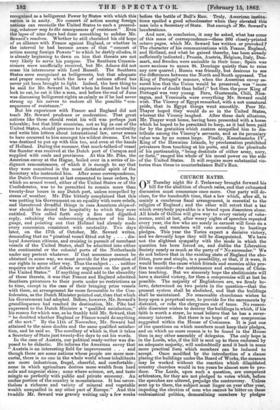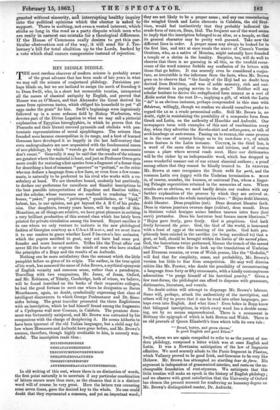CHURCH RATES. O N Tuesday night Sir J. Trelawney brought forward
his bill for the abolition of church rates, and that exhausted discussion must commence once more. One party will de- clare, for the hundredth time, that a law which, after all, is mainly a cumbrous fiscal arrangement, is essential to the religion of England ; and the other will retort that a tax which everybody pays alike is a: brand upon dissenters alone. All kinds of Gallios will give way to every variety of vehe- mence, until at last, after weary nights of speeches repeated every year, the few who are sorely in earnest will force 6n a division, and members will vote according to hustings pledges. This year the Tories expect a decisive victory, and we devoutly hope they will be disappointed. We have not the slightest sympathy with the mode in which the question has been forced on, and dislike the Liberation Society nearly as much as the party of " No surrender." We do not believe that in the existing state of England the abo- lition, pure and simple, is a possibility, or that, if it were, it would benefit the cause which friends and enemies alike pro- fess to consider—the maintenance and extension of Chris- tian teaching. But we sincerely hope the abolitionists will have a decided victory-, for then a compromise will at last be possible. The majority of Englishmen are, we firmly be- lieve, determined on two points in the question—that the present system shall be abolished, and that the buildings shall be maintained. No reasonable churchman wishes to keep open a perpetual sore, to provide for the sacraments by distraint, or robe the clergymen out of taxes. No reason- able dissenter wishes to destroy the buildings in which, if his faith is worth a straw, he must believe that he has a rever- sionary interest. But there is no hope of any compromise suggested within the House of Commons. It is just one of the questions on which members must keep their pledges, and on which no more reason is to be found in the House than in any other assembly of delegates. The only hope is in the Lords, who, if the bill is sent up to them endorsed by an adequate majority, will undoubtedly send it back in some more practical form which members can be induced to accept. Once modified by the introduction of a clause placing the buildings under the Board of Works, the measure may be worked without the reaction which dilapidated country churches would in ten years be almost sure to pro- duce. The Lords, upon such a question, are competent arbitrators, for they are not pledged to votes which, before the speeches are uttered, prejudge the controversy. Unless sent up to them, the subject must linger on year after year, impeding the election of men who cannot be bitter on these ecclesiastical politics, demoralizing members by pledges granted without sincerity, ana interrupting healthy inquiry into the political opinions which the elector is asked to support. There is nothing, not even a vested interest, which sticks so long in the road as a party dispute which men who are really in earnest can mistake for a theological difference. If the House of Commons really desires to get this par- ticular. 'obstruction out of the way, it will send Sir J. Tre- lawney's bill for total abolition up to the Lords, backed by a vote which shall ensure compromise instead of rejection.































 Previous page
Previous page